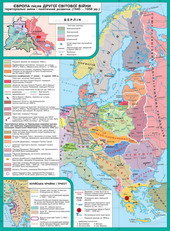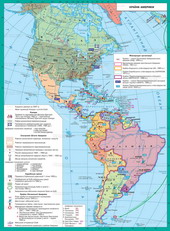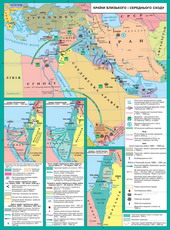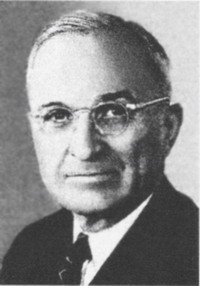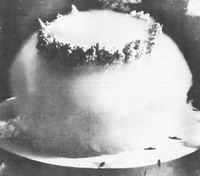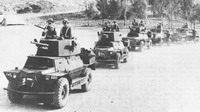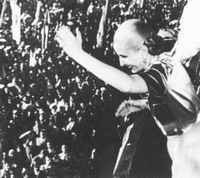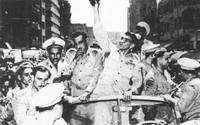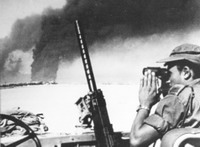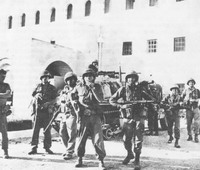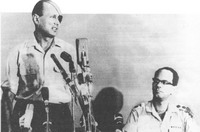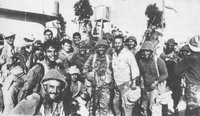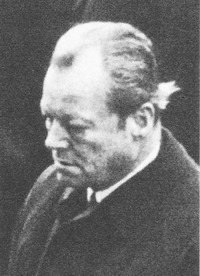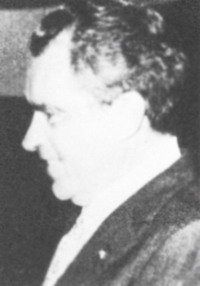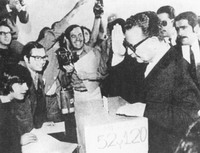§11. United States in 1960-70's
1. Presidency D. Kennedy and L. Johnson
In the elections of 1960 U.S. Presidentwas elected leader of the Democratic Party D. Kennedy(1917-1963). Democrats came to power in a good economic momentDevelopment Foundation. STC, which started in the 50's, 60-E gave a significant increaseproduction. On the first plan out the production based on the latestachievements of scientific progress - electricity, electronics, chemicalindustry. STC stimulated and agricultural development - socalled "green revolution". Science evolved in the industry.Research and experimental development (R & D) became the drivingforce of progress. The rapid growth of production lasted until 1967 AfterThis growth rate slowed down and reached 1% per year. 60 yearscharacterized by a high degree of state intervention in the economy andregulation of social relations in American society.
Kennedy victory in the electionspozhvavyla reformist activities. Measures being taken to stimulateeconomic growth. To this end, inflation and usedfiscal deficit (Keynesian theory).
The program included a comprehensivePerestroika regions of chronic depression, help farmersraising the minimum wage, improving social securityretrain the unemployed and other measures to increase thesolvent demand and an additional economic stimulusgrowth. Important role in the program assigned to the problems of civil rights,national minorities, women, youth. Overall the program went outoutside their own economy and had to withdraw the U.S. to "new frontiers"(Got the name of this program.)
Some of the planned activities werenature of social reform and began to take place already in the 1961-1962 biennium It wasincreased the hourly minimum wage, increased unemployment benefits,root program of training and retraining workers. Socialprogram in conjunction with state programs to stimulate investmentensure the dynamic development of the United States for 60 years.
In order to bring the U.S.leader in space exploration, Kennedy proposed a programApollo, whose mission was landing Americans on the moon, which wasmade in July 1969 U.S. astronauts Armstrong and N.E. Oldinom.
I wonder
April 12, 1961 citizenUSSR, Yuri Gagarin made the world's first space flight. Kennedy's first reactionwas neutral, but when he saw that this event is the world's gave highpositive dividends of the USSR, he two days thereafter convene a meeting in the Whitehouse where emotional states: "Is there is any area where we can tocatch up? What can you do? Can I fly around the moon before them? .. Canrun man on the moon before them?. Can they outrun?? If onlyanyone who would say, as they catch up! Let's find someoneanyone. Me anyway, let this be the keeper that he knew how. "
Kennedy was promising careerinterrupted: November 22, 1963 He was killed in Dallas. Toso far and finally specifies the who killed the president and who wasbehind the killers. Pop many versions: maniac, loner assassin Lee HarveyOswald (basic version), accused the CIA, the Mafia, Lyndon Johnson and the secretService, Edgar Hoover and the FBI right extremists in league with rich oilcompanies, Cuban emigration, Cuba's leader F. Castro, representativesmilitary-industrial complex, USSR. Such a variety of versions shows thatKennedy zachipala activity interests of all those groups.
New U.S. President was Lyndon JohnsonWho put forward an ambitiousplan for building a "Great Society" without poverty, unemployment,crime, serious diseases. He set a task to eliminate poverty in the U.S..Largely plan was motivated by personal desire to beat JohnsonKennedy. As a result of actions taken (raising the minimum wagefees, provision of subsidies and loans to farmers, increased spending on healthhealth, education, housing, the creation of employment cases,assistance to those living below the poverty line), the number of poor in Americadecreased from 36.4 million to 25.4 million people, but not completely eliminate povertyfailed.
In foreign policy, Democratsmade the doctrine of "flexible response". Its essence was toadequate response to the actions of the USSR over the world. In the period ofDemocrats held deteriorating relations between the USSR and the USA. Was the culminationCuban Missile Crisis (1962). Then began the normalization of relations betweenthe two countries. June 16, 1963 Kennedy even said that the U.S. is ready"Conduct peaceful competition with any other system on Earth."Improving the relationship lasted long. Kennedy Assassination and the U.S. involvement inwar in Vietnam long blocked the process.
United States also changed their attitudes toLatin American countries. It was a program of "Union forprogress "that was to promote reforms to overcomesocio-economic contradictions in the region. Since 1961 by 1968United States provided assistance to Latin America of $ 4.5 billion.
2. Mass movements for civil rights
In 40 and 60 years in the United States launchedfight for civil rights of various social strata, includingAmerican blacks against racial discrimination. This was associated with changethe status of Negro population. During World War II increased demand forworkforce in the industrial cities of northern United States, and many blacks left the Southcountries where they were subjected to brutal discrimination and actually were deprivedright to vote. In the north, where there were no traditions of racial segregation, the Negro is activelyinvolved in the political struggle. Their voices were strong support forDemocratic Party and she could not ignore their demands. In 1948Blacks were forbidden to discriminate in hiring for civil service started preparingto eliminate discrimination in the army.
In 50 years of the struggle came innew phase. Recognized leader Negro population was Martin Luther King, A Baptist pastor. He suggesteduse non-violent tactics in the fight action of Mahatma Gandhi. Such tacticspromote involvement in the fight large population. In 1955 Kingorganized a boycott of the bus in Alabama, which held segregationpassengers. In 1956, Supreme Court declared such segregationunconstitutional. Earlier, the Supreme Court declared illegal segregation inschool. Such court nashtovhuvalys considerable resistance to white in the South USA. In1957 for enforcement of court decisions in Little Rock (Arkansas) wasused force.
In 60 years of the movement for civillaw coincided with the beginning of the mass movement of social protest. Then schoolcompleted numerical generation of Americans that were born after the war. It wasthe first generation that grew up in the state of prosperity. It has not seen massunemployment and poverty, considered social security and material wealthnorm. Their values significantly different from the values of their parents.Young was inclined to deny the value of a consumer society, itadvocated for greater simplicity of life, free from conventions and hypocrisy. SymbolThis counterculture became jeans and rock 'n' roll. The struggle for reformuniversity education quickly developed into a movement against the Vietnam War: "BecauseWhy should soldiers die in Vietnam and to die in `yetnamski children? Whyincreasing pressure on universities by the military departments and governmentofficials? "and others. The Vietnam War was first shown on television.Every day, Americans saw scenes of violence and blood. Youth with its sharpsense of justice, youth who was to become cannon fodder in thisWar has become the biggest enemy of this war. Younger generation. Thatdisillusioned in the old ideals, has a new look. Their teachers were MaoZedong, Herbert Marcuse, Che Gavar. We can not say that the views of young people hadprecise formulation. Rather it was a fulminating mixture of the ideas of communism, anarchism,Existentialism and more. Young people do not really care of theoretical reflections, ithave adopted the slogan of Mao's "rebellion - a sure thing." Youth Homeperformances took place in 1964 It was things. academic movement. Events eruptedthe University of Berkeley in California. To suppress the speech of students hadapplied forces. But the performances of young people are not stopped. Newcatalyst was the war in Vietnam. Gather thousands of demonstrations.Youth to protest U.S. flag burned, uhylyalas of conscription for militaryservice, demanded the release from custody of military universities and others. Together withyouth movement active in all sorts of far-right, extremist ultraliviorganizations and organized crime. In the 60's tragic events have occurred thatgained unprecedented social and political resonance. In 1968, killedD. Kennedy brothers - Robert, who put forward his candidacy forpresident. In the same year was shot Martin Luther King, who1964 awarded the Nobel Peace Prize. His death sparked massiveracial concerns ("black riots" 1964 - 1969) to suppress themused army.
In 70 years of mass movementsstopped. The reason for this was not the policy of the Republicans. What victoryelections of 1968, and the economic crisis 70 years that changed the priorityproblems facing the population. In addition, most of the requirements of massmotion was approved: U.S. troops were withdrawn from Vietnam, abolishedgeneral conscription, racism is put outside the law, and in 1972entered into force on 26 amendment to the U.S. Constitution, which gave a voice to youth18.
3. Crisis 70 years. R. Nixon Presidency, Dzh.Forda,Dzh.Kartera.
In presidential elections1968 Republicans got the victory. Became President Richard Nixon (1913-1994).
Already in the early years ofRepublicans were shocked by the U.S. economic crisis. The peculiarity of this cycliccrisis of overproduction (1969-1970 biennium) was the fact that layoffs andaccompanied by rising unemployment, price increases this phenomenon was calledinflation). Late 60's began energy difficulties that resulted in1973 the energy crisis, which deepened the previous overproduction. Itimmediately led to a new decline in output, rising unemployment, a significanthigher prices. All this has forced the Republicans to give up policiesneokonservatyzmu they proclaimed, and to resort to active usemethods of state regulation of economy. In January 1971 R. Nixon eventold reporters: "I now keynsianets.
Economiccrisis - A sudden collapse, reducing production,accompanied by destruction of the most enterprises, rising unemployment,falling wages and stocks.
To overcome the economic difficultieshas developed a program of measures that had the name "new economicpolicy. The result of that policy is broader nationalregulation. For the first time in peacetime was introduced price controls. Excessivelyincreased government spending on social programs. But all these measures wereineffective. In 1973-1974 he U.S. hit and the political crisis thatfound all the deficiencies of American political system and state apparatus.
Features ofcrisis of 1973-1975 he U.S.
|
Recession with rising prices and uncontrolled inflation
|
|
Surging unemployment.
|
|
Falling standards of living.
|
|
Pereplelasya overproduction crisis with a structural, raw material, monetary and financial.
|
|
The economic crisis coincided with the political and crisis.
|
June 17, 1972 duringcampaign to the headquarters of Democratic Party in the hotel"Watergate" climbed their political competitors, to establishpidsluhovuyuchu equipment. They were found and arrested. Wagoner grand"Uoterheytskyy scandal. As a result of President Nixon investigationhad in 1974 resign. At the same time, it was decidedthe introduction of state funding of presidential elections. Place Nixontook the vice-president Gerald Ford (1974-1976 biennium).
I wonder
American historian A. Schlesingercalls as the main causes of R. Nixon impeachment by the factthat Nixon could be too "strong" president. In the struggle with crisisphenomena in the economy and social crisis that was generated by the war in Vietnam,youth riots, Nixon - an experienced, energetic and strong-willed politician -like a rose over Congress, violating the traditional relationship of executive andlegislature in the U.S.. That is what the president has made "uncomfortable" and led tohis resignation. In addition, the media debate eruptedthe consequences of d Its proponentsargued that the detente benefit only the Soviet Union. It was the Soviet Union getspolitical capital in the world, receives substantial economic benefits from the regimemost-favored trade with the U.S..
In foreign policy, RepublicansR. Nixon and Dzh.Ford tried to implement the policy of detente: the normalizationrelations with the Soviet Union, limiting strategic nuclear weapons, threat reductionignition of nuclear war. Also normalize U.S. relations with communistChina (1971) stopped the war and withdraw troops from Vietnam in (in1975 Communists won the civil war in the south of Vietnam).The defeat in Vietnam gave birth in the U.S. so-called `in yetnamskyy syndrome - fearbe involved in a long bloody conflict with no prospect of victory.
Period presidency Dzh.Fordaleast studied in U.S. history. The years of his rule occur in mosttragic time in the postwar period in history: economic crisis, growthcrime, the effects of political crisis that has undermined trust in institutionspower, end in `yetnamskoyi war disillusionment in society. Ford, with itsbalanced and calm character not restore trust in governmentPresident, American soul inspire hope in the future. But"Uoterheytskyy scandal" so undermined the prestige of the Republicanthat the presidential election in 1976 Democrat winner Jimmy CarterState GovernorGeorgia, a specialist in nuclear energy.
During his presidency wasbreak in confidence in American society. It sure the it is impossibleemerge from the crisis with government regulation. For Carter, a Democrat wasfatal consequences, because they associated with state regulation, althoughhis policy he tried to implement the opposite strategy Specifically, he cut social programs.Try to align public expenditures and revenues. These changes played into the hands ofRepublicans. Moreover, failure in the release of U.S. diplomats inTehran, where Islamic revolution took place, (1979) gave a reason forAdministration charges in weakness. A new phase of energy crisis(1979-1980 biennium) added new economic problems.
Results
60-70-years were a major milestone inU.S. history. This period is the period that was initiated «new course "F. Roosevelt. During this period, Americans for zamahnulysyaachieve the "new frontiers", a "great society" and sought"Finally overcome poverty." But the reality of 70 years forced the U.S. to focusin solving other problems. Imminent crises one after another. Americaneeded changes.
Questions and tasks:
1. As called development strategy proposed by J. Kennedy U.S.? What isKennedy grounded domestic policy?
2. What was the difference policies Kennedy and Johnson?
3. What are the main achievements of the Board of Democrats in the 60's.
4. Name the major foreign policy events connected with the board of Democrats.
5. Identify the main causes of mass social movements in the U.S. in 50 and 60 years?
6. Specify the components of mass movements in the U.S. in 60 years?
7. With `yasuyte consequences and results of mass movements.
8. What are the achievements and failures of the Nixon presidency?
9. What Uoterheytskyy scandal? What are its lessons and implications?
10. What is the impact of economic crisis 70 years on the development of the U.S.?
 English
English
